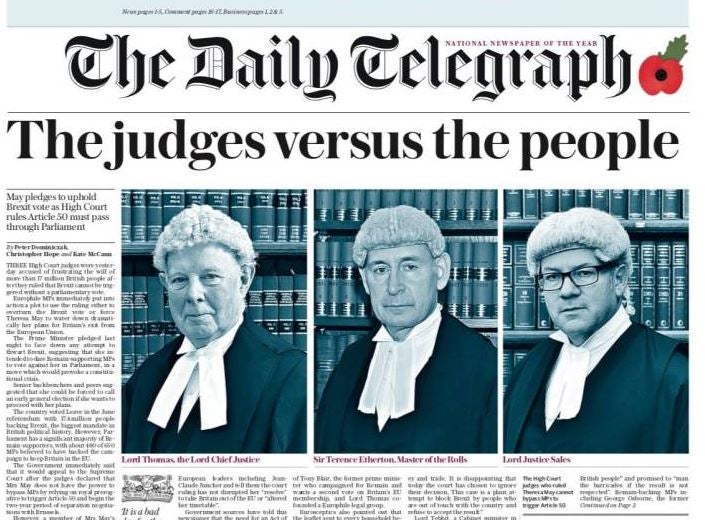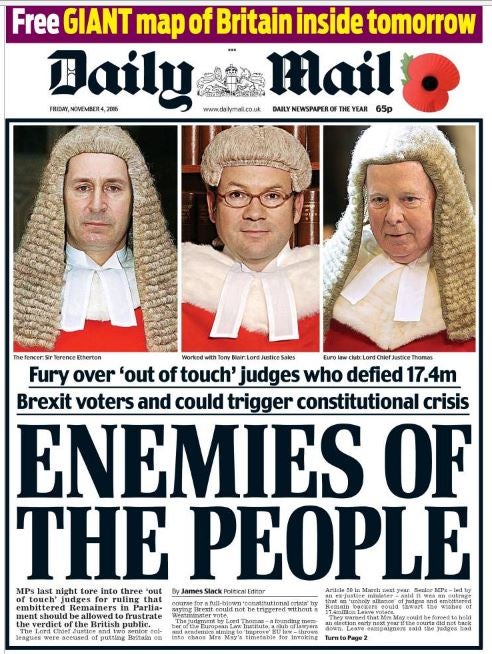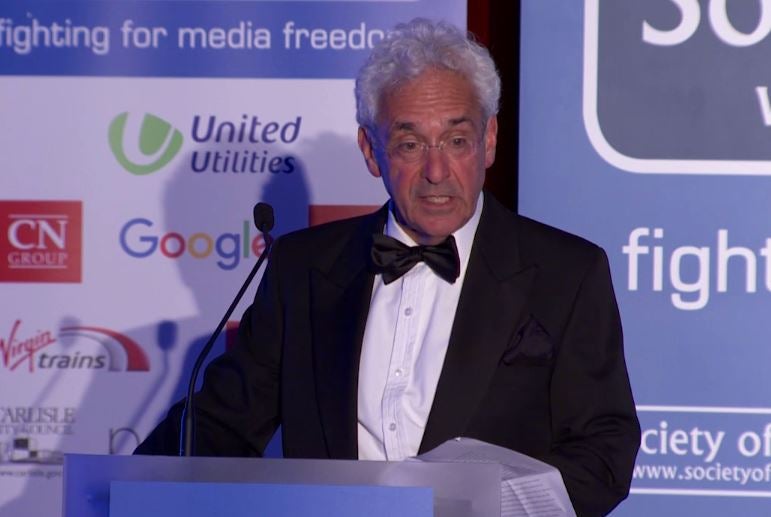
The chairman of press regulator IPSO has said Lord Chancellor Liz Truss did not go far enough in her response to attacks on the judiciary last week which were led by national newspapers.
The Daily Mail on Friday described three judges as “enemies of the people” on its front page. And the Daily Telegraph published the judges’ pictures along with the headline: “The judges versus the people”.

They were responding to the High Court ruling that Prime Minister Theresa May cannot trigger Article 50 (to leave the European Union) without consulting Parliament.
Truss faced criticism for not defending the judges, and then issued a statement saying: “The independence of the judiciary is the foundation upon which our rule of law is built and our judiciary is rightly respected the world over for its independence and impartiality.”
IPSO chairman Sir Alan Moses, who is a former appeal court judge, was asked by the BBC yesterday whether the Truss statement went far enough.
He said: “I don’t think it sufficiently describes the really fundamental issue about which I can’t really believe there was any dispute in the High Court.
“The question was whether by seeking to invoke Article 50 without going to Parliament inevitably statutory rights were taken away. That’s a question which you can debate.
“But the fundamental constitutional question, which I would have thought was chapter one, first paragraph of the Ladybird book of the constitution, was that government can’t take away the people’s statutory rights, only Parliament can do that.
“And that’s the fundamental constitutional issue that I can’t believe anybody was disputing.”
Asked whether he expected Truss to do more to defend the judiciary, he said: “Absolutely, it’s not what I expect, she’s under a statutory obligation to uphold the rule law, essential to which is protecting the judges from ignorant criticism.”

Asked what he thought about the “visceral attacks” by The Sun, Daily Mail and Daily Telegraph on the judiciary, he said: “I’m not going to make any comment at all because any issue about whether the press is in breach of the code in what they wrote is a matter for IPSO and its committee and it would be quite wrong of me to make a running commentary.”
He added that part of the problem was due to the fact that judges are “hopelessly bad at communicating with the press “.
Prime Minister Theresa May yesterday spoke up for press freedom: “I believe in the value of the independent of our judiciary. I also value the freedom of our press. I think those both underpin our democracy and they are important.”
But former Chairman of the BBC Lord Patten said: “Here we are with a debate in this country which is starting to make us look mean and a bit nasty. Theresa May should make it clear that she doesn’t like the way that tabloid editors have been pushing this debate, that we need to behave more decently to one another with a great deal more respect.”
Conservative MP and former attorney general Dominic Grieve said on Friday that press criticism of the three judges was “chilling and outrageous” and “smacks of the fascist state”.
He said reading some of newspaper coverage was like “living in Robert Mugabe’s Zimbabwe … I think there’s a danger of a sort of mob psyche developing”.
Sun columnist Trevor Kavanagh wrote today: “There is nothing sacred about these bewigged M’Luds.
“Indeed, last week’s High Court ruling might well be overturned by another lot in the Supreme Court next month.
“The idea that judges are above criticism is as daft as suggesting the Bank of England is free to put the economy at risk with ‘funny money’ because its governor is independent.
Email pged@pressgazette.co.uk to point out mistakes, provide story tips or send in a letter for publication on our "Letters Page" blog

